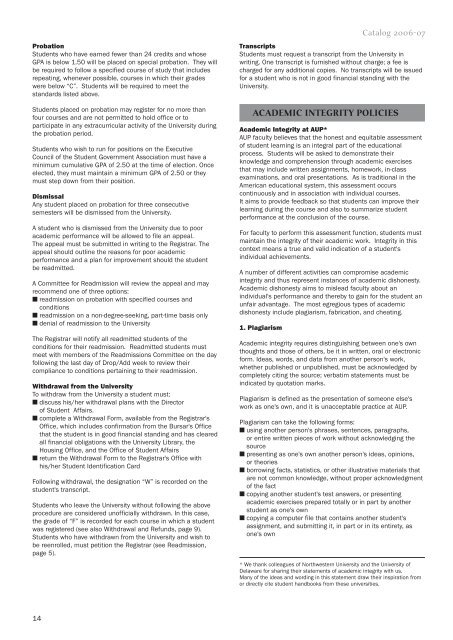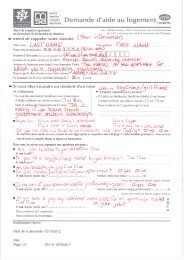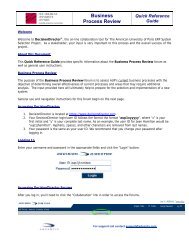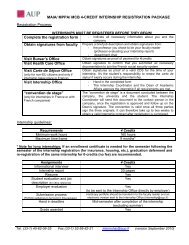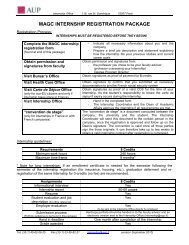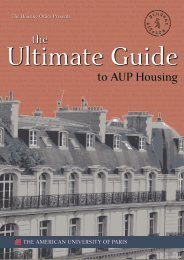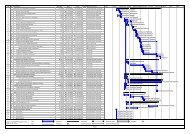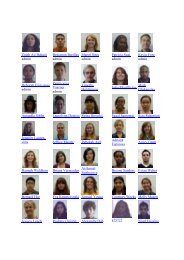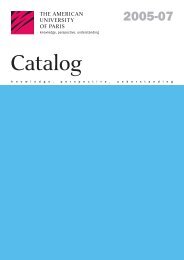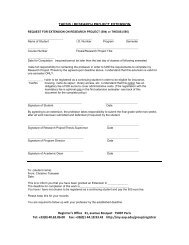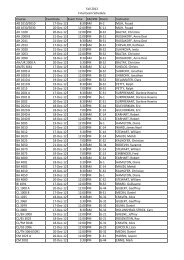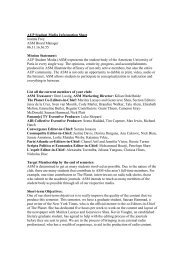Course Catalog 2006-2007.pdf - The American University of Paris
Course Catalog 2006-2007.pdf - The American University of Paris
Course Catalog 2006-2007.pdf - The American University of Paris
Create successful ePaper yourself
Turn your PDF publications into a flip-book with our unique Google optimized e-Paper software.
Probation<br />
Students who have earned fewer than 24 credits and whose<br />
GPA is below 1.50 will be placed on special probation. <strong>The</strong>y will<br />
be required to follow a specified course <strong>of</strong> study that includes<br />
repeating, whenever possible, courses in which their grades<br />
were below “C”. Students will be required to meet the<br />
standards listed above.<br />
Students placed on probation may register for no more than<br />
four courses and are not permitted to hold <strong>of</strong>fice or to<br />
participate in any extracurricular activity <strong>of</strong> the <strong>University</strong> during<br />
the probation period.<br />
Students who wish to run for positions on the Executive<br />
Council <strong>of</strong> the Student Government Association must have a<br />
minimum cumulative GPA <strong>of</strong> 2.50 at the time <strong>of</strong> election. Once<br />
elected, they must maintain a minimum GPA <strong>of</strong> 2.50 or they<br />
must step down from their position.<br />
Dismissal<br />
Any student placed on probation for three consecutive<br />
semesters will be dismissed from the <strong>University</strong>.<br />
A student who is dismissed from the <strong>University</strong> due to poor<br />
academic performance will be allowed to file an appeal.<br />
<strong>The</strong> appeal must be submitted in writing to the Registrar. <strong>The</strong><br />
appeal should outline the reasons for poor academic<br />
performance and a plan for improvement should the student<br />
be readmitted.<br />
A Committee for Readmission will review the appeal and may<br />
recommend one <strong>of</strong> three options:<br />
■ readmission on probation with specified courses and<br />
conditions<br />
■ readmission on a non-degree-seeking, part-time basis only<br />
■ denial <strong>of</strong> readmission to the <strong>University</strong><br />
<strong>The</strong> Registrar will notify all readmitted students <strong>of</strong> the<br />
conditions for their readmission. Readmitted students must<br />
meet with members <strong>of</strong> the Readmissions Committee on the day<br />
following the last day <strong>of</strong> Drop/Add week to review their<br />
compliance to conditions pertaining to their readmission.<br />
Withdrawal from the <strong>University</strong><br />
To withdraw from the <strong>University</strong> a student must:<br />
■ discuss his/her withdrawal plans with the Director<br />
<strong>of</strong> Student Affairs.<br />
■ complete a Withdrawal Form, available from the Registrar's<br />
Office, which includes confirmation from the Bursar's Office<br />
that the student is in good financial standing and has cleared<br />
all financial obligations with the <strong>University</strong> Library, the<br />
Housing Office, and the Office <strong>of</strong> Student Affairs<br />
■ return the Withdrawal Form to the Registrar's Office with<br />
his/her Student Identification Card<br />
Following withdrawal, the designation “W” is recorded on the<br />
student's transcript.<br />
Students who leave the <strong>University</strong> without following the above<br />
procedure are considered un<strong>of</strong>ficially withdrawn. In this case,<br />
the grade <strong>of</strong> “F” is recorded for each course in which a student<br />
was registered (see also Withdrawal and Refunds, page 9).<br />
Students who have withdrawn from the <strong>University</strong> and wish to<br />
be reenrolled, must petition the Registrar (see Readmission,<br />
page 5).<br />
<strong>Catalog</strong> <strong>2006</strong>-07<br />
Transcripts<br />
Students must request a transcript from the <strong>University</strong> in<br />
writing. One transcript is furnished without charge; a fee is<br />
charged for any additional copies. No transcripts will be issued<br />
for a student who is not in good financial standing with the<br />
<strong>University</strong>.<br />
ACADEMIC INTEGRITY POLICIES<br />
Academic Integrity at AUP*<br />
AUP faculty believes that the honest and equitable assessment<br />
<strong>of</strong> student learning is an integral part <strong>of</strong> the educational<br />
process. Students will be asked to demonstrate their<br />
knowledge and comprehension through academic exercises<br />
that may include written assignments, homework, in-class<br />
examinations, and oral presentations. As is traditional in the<br />
<strong>American</strong> educational system, this assessment occurs<br />
continuously and in association with individual courses.<br />
It aims to provide feedback so that students can improve their<br />
learning during the course and also to summarize student<br />
performance at the conclusion <strong>of</strong> the course.<br />
For faculty to perform this assessment function, students must<br />
maintain the integrity <strong>of</strong> their academic work. Integrity in this<br />
context means a true and valid indication <strong>of</strong> a student's<br />
individual achievements.<br />
A number <strong>of</strong> different activities can compromise academic<br />
integrity and thus represent instances <strong>of</strong> academic dishonesty.<br />
Academic dishonesty aims to mislead faculty about an<br />
individual's performance and thereby to gain for the student an<br />
unfair advantage. <strong>The</strong> most egregious types <strong>of</strong> academic<br />
dishonesty include plagiarism, fabrication, and cheating.<br />
1. Plagiarism<br />
Academic integrity requires distinguishing between one's own<br />
thoughts and those <strong>of</strong> others, be it in written, oral or electronic<br />
form. Ideas, words, and data from another person's work,<br />
whether published or unpublished, must be acknowledged by<br />
completely citing the source; verbatim statements must be<br />
indicated by quotation marks.<br />
Plagiarism is defined as the presentation <strong>of</strong> someone else's<br />
work as one's own, and it is unacceptable practice at AUP.<br />
Plagiarism can take the following forms:<br />
■ using another person's phrases, sentences, paragraphs,<br />
or entire written pieces <strong>of</strong> work without acknowledging the<br />
source<br />
■ presenting as one's own another person's ideas, opinions,<br />
or theories<br />
■ borrowing facts, statistics, or other illustrative materials that<br />
are not common knowledge, without proper acknowledgment<br />
<strong>of</strong> the fact<br />
■ copying another student's test answers, or presenting<br />
academic exercises prepared totally or in part by another<br />
student as one's own<br />
■ copying a computer file that contains another student's<br />
assignment, and submitting it, in part or in its entirety, as<br />
one's own<br />
* We thank colleagues <strong>of</strong> Northwestern <strong>University</strong> and the <strong>University</strong> <strong>of</strong><br />
Delaware for sharing their statements <strong>of</strong> academic integrity with us.<br />
Many <strong>of</strong> the ideas and wording in this statement draw their inspiration from<br />
or directly cite student handbooks from these universities.<br />
14


